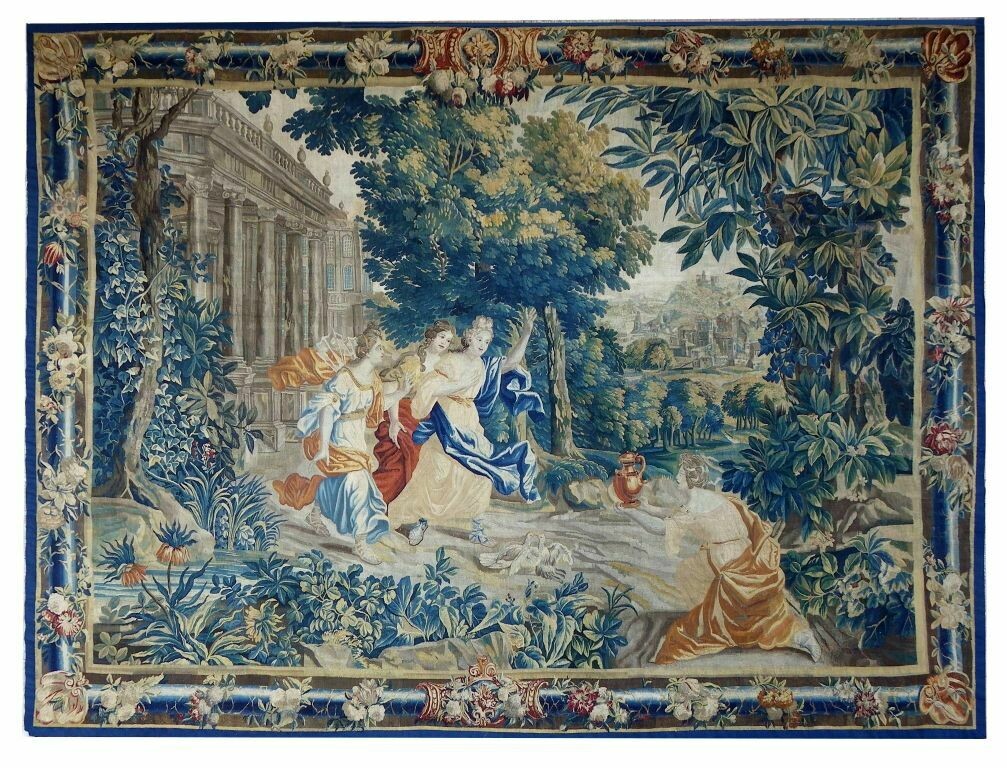Brussels Tapestry - History of Psyche - Period: 18th century - Size: L372xH280
€0.00
Sold out
Sold out
Product Details
Description
Reference No.: 78J/ 2644
Origin: Flanders - Brussels
Period: Early 18th century
Provenance: Private Collection
Composition: Wool and silk
Dimension: W 3.72x H 2.80
Tapestry of Brussels early 18th century - History of Psyche
Flemish Tapestry, Brussels, finely woven in wool and silk around 1700.
Our panel has as its register; The Sisters of Psyche in front of the Palace of Love.
Graceful young women accompanied by an invisible servant of the psyche run in front of the beautiful palace of Love.
This tapestry has kept beautiful colours.
History
Psyche wife of Eros (Cupid), is the personification of the soul represented with wings of a butterfly. Psyche is one of a king's three daughters, so beautiful that all the inhabitants of the kingdom adored her and Aphrodite was jealous of her to the point of wanting to plot her loss.
I- Love
She sent Eros with the mission of inspiring her with love for the most hideous being on earth. But such is the one who thought he was taking: Eros also falls under the spell of Psyche. He asked Apollo to give an oracle to the king ordering him to expose his daughter on a rock. There dressed in black, submissive, she waited for the monster to come, but it was Zephyr's light breath that carried her to a mysterious palace. She is the only resident of this wonderful palace where the doors are decorated with precious stones and the floor is paved with pure gold.
She can never see the master of the ocean but he visits her every night, and promises her that their happiness will always last, on the condition that she does not try to see the face of her lover.
But Psyche's sisters persuade her that she is loved by a monster. One night, she lights a lamp. As she gazes with delight at the beauty of her lover, a drop of oil falls on him. He wakes up and runs away, so the enchanted palace disappears.
II - Revenge
A series of trials began for Psyche, from which she emerged thanks to the tenacity of her love.
Chased from all sides, she finally arrived in the home of her rival: Aphrodite.
The latter burdened her with a thousand torments, held her as a slave and imposed four trials deemed impossible on her. But every time someone will be there to help him.
Thus, she sorts mixed seeds of all species using ants, she brings back the golden wool of ferocious sheep thanks to a reed that shows her the right way to cross the river. She draws the inaccessible water from the Styx with the help of the Zeus eagle.
For the last trial, Psyche had to go to hell to ask Persephone for a precious bottle containing a beauty lotion; convinced that she could not succeed, she was about to throw herself off a tower when the tower started talking to her and showed her the way forward; she was recommended not to open it and not to share Persephone's meal.
Normally, no mortal could go to hell without being devoured by his terrible guardian: Cerberus. To pass through the door of hell without damage, Psyche gave the monster a cake soaked in drugged wine that put him to sleep.
She had not forgotten to take two coins to pay Charon on the way in and out.
But on her return, when everything went well, Psyche was again lost by her curiosity; she opened the bottle, a black smoke spread and deposited on her face which became hideous. Looking in a mirror, Psyche vanishes. However, Eros has not forgotten her, he awakens her with a shot of his arrows and restores her first beauty.
Finally, Zeus intervenes and Aphrodite forgives:
Zeus grants his pardon to Eros and summons the gods to celebrate the immortality of Psyche and the marriage of the couple.
The newlyweds will have a daughter: Hêdonê in Greek or Volupté for the Romans.
III - Symbolism
The myth of Psyche symbolizes the destiny of the fallen soul, which, after many trials, unites forever with divine love. The Neo-Platonists saw in it the promise of a rebirth, of a future life, of an eternal happiness.
Psyche is often depicted with butterfly wings, because the soul had the butterfly as a symbol. The charming account of Apuleius made known the popular interpretation of this allegory.
IV - Psyche in Art
The myth of Psyche has often inspired Greek artists: a series of bronzes, terracotta, engraved stones, coins, frescoes by Pompeii, Eros and Psyche du Capitole, bas-reliefs by sarcophagi. Raphael recounted the main episodes of Psyche's fable in a series of compositions that adorned the loggia of the Farnese Palace.
Our house assures you the sale of a tapestry with invoice and approved expertise, well cleaned, in good condition with its fixing system. If necessary, we will inform you of the work that has been done. All our tapestries can be presented to you at your home in France and neighbouring countries before your final decision.
Save this product for later
Display prices in:
EUR



